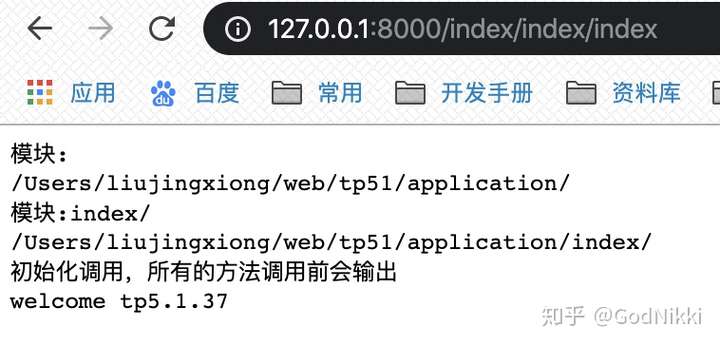转自:https://zhuanlan.zhihu.com/p/100640786
从代码说起:
// 入口文件
// 执行应用并响应
Container::get('app')->run()->send();获取容器中的'app'实例,并执行App.php中的run()方法,首先我们来看看run()方法中第一步初始化应用:
public function run()
{
try {
// 初始化应用
$this->initialize();
...
}
- bool initialized,定义这个属性的目的是让该方法只能执行一次,即初始化只用执行一次,第二次进来直接就返回了。
2. static::setInstance($this),设置当前容器的实例,其实在入口文件中就已经实例化了app,即Container::get('app')时,这里再一次调用是为了把上面的属性存入app实例中。
3. 加载环境变量配置文件时,为什么可以通过$this->env->load 调用到Env类的load方法?
因为当前类App是继承于Container类的,$this->env 那么App类中没有Env属性,就会到父类Container类中去寻找Env属性,父类中没有Env属性就会触发父类的__get()方法 而__get()方法传递的参数就是Env,在__get()方法中调用make()方法创建Env类的实例。
public function initialize()
{
if ($this->initialized) {
return;
}
$this->initialized = true;
$this->beginTime = microtime(true);
$this->beginMem = memory_get_usage();
$this->rootPath = dirname($this->appPath) . DIRECTORY_SEPARATOR; // /Users/liujingxiong/web/tp51/
$this->runtimePath = $this->rootPath . 'runtime' . DIRECTORY_SEPARATOR;
$this->routePath = $this->rootPath . 'route' . DIRECTORY_SEPARATOR;
$this->configPath = $this->rootPath . 'config' . DIRECTORY_SEPARATOR;
// 容器对象实例,其实在入口文件中就已经实例化了app,这里再一次调用是为了把上面的属性存入app实例中
static::setInstance($this);
// 绑定一个类实例到容器
$this->instance('app', $this);
// 加载环境变量配置文件
if (is_file($this->rootPath . '.env')) {
$this->env->load($this->rootPath . '.env');
}
// 获取配置文件后缀名
$this->configExt = $this->env->get('config_ext', '.php');
// 加载惯例配置文件
$this->config->set(include $this->thinkPath . 'convention.php');
// 设置路径环境变量
$this->env->set([
'think_path' => $this->thinkPath,
'root_path' => $this->rootPath,
'app_path' => $this->appPath,
'config_path' => $this->configPath,
'route_path' => $this->routePath,
'runtime_path' => $this->runtimePath,
'extend_path' => $this->rootPath . 'extend' . DIRECTORY_SEPARATOR,
'vendor_path' => $this->rootPath . 'vendor' . DIRECTORY_SEPARATOR,
]);
$this->namespace = $this->env->get('app_namespace', $this->namespace);
$this->env->set('app_namespace', $this->namespace);
// 注册应用命名空间 这里就不再赘述,详见类的自动加载
// $this->appPath 就是应用的目录application
Loader::addNamespace($this->namespace, $this->appPath);
// 初始化应用
$this->init();
// 开启类名后缀
$this->suffix = $this->config('app.class_suffix');
// 应用调试模式
$this->appDebug = $this->env->get('app_debug', $this->config('app.app_debug'));
$this->env->set('app_debug', $this->appDebug);
if (!$this->appDebug) {
ini_set('display_errors', 'Off');
} elseif (PHP_SAPI != 'cli') {
//重新申请一块比较大的buffer
if (ob_get_level() > 0) {
$output = ob_get_clean();
}
ob_start();
if (!empty($output)) {
echo $output;
}
}
// 注册异常处理类 冗余了 在containerConfigUpdate()方法中
/** @see App::containerConfigUpdate() */
if ($this->config('app.exception_handle')) {
Error::setExceptionHandler($this->config('app.exception_handle'));
}
// 注册根命名空间
if (!empty($this->config('app.root_namespace'))) {
Loader::addNamespace($this->config('app.root_namespace'));
}
// 加载composer autofile文件
Loader::loadComposerAutoloadFiles();
// 注册类库别名
Loader::addClassAlias($this->config->pull('alias'));
// 数据库配置初始化 这里也冗余了
/** @see App::containerConfigUpdate() */
Db::init($this->config->pull('database'));
// 设置系统时区
date_default_timezone_set($this->config('app.default_timezone'));
// 读取语言包
$this->loadLangPack();
// 路由初始化
$this->routeInit();
}4. 执行初始化应用$this->init()讲解:该方法传递一个$model参数,但是我们为什么默认会走到index模块呢?原理该方法在多个地方被调用,可以采用debug_backtrace()进行回溯追踪函数调用信息,会明确显示调用地址。init()方法会加载各种配置文件。


public function init($module = '')
{
// var_dump(debug_backtrace()); // 回溯追踪函数调用信息
// 定位模块目录
$module = $module ? $module . DIRECTORY_SEPARATOR : '';
$path = $this->appPath . $module;
//echo '模块:'. $module . PHP_EOL;
//echo $path . PHP_EOL;
// 加载初始化文件
if (is_file($path . 'init.php')) {
include $path . 'init.php';
} elseif (is_file($this->runtimePath . $module . 'init.php')) {
include $this->runtimePath . $module . 'init.php';
} else {
// 加载行为扩展文件
if (is_file($path . 'tags.php')) {
$tags = include $path . 'tags.php';
if (is_array($tags)) {
$this->hook->import($tags);
}
}
// 加载公共文件
if (is_file($path . 'common.php')) {
include_once $path . 'common.php';
}
if ('' == $module) {
// 加载系统助手函数
include $this->thinkPath . 'helper.php';
}
// 加载中间件
if (is_file($path . 'middleware.php')) {
$middleware = include $path . 'middleware.php';
if (is_array($middleware)) {
$this->middleware->import($middleware);
}
}
// 注册服务的容器对象实例
if (is_file($path . 'provider.php')) {
$provider = include $path . 'provider.php';
if (is_array($provider)) {
$this->bindTo($provider);
}
}
// 自动读取配置文件
if (is_dir($path . 'config')) {
$dir = $path . 'config' . DIRECTORY_SEPARATOR;
} elseif (is_dir($this->configPath . $module)) {
$dir = $this->configPath . $module;
}
$files = isset($dir) ? scandir($dir) : [];
foreach ($files as $file) {
if ('.' . pathinfo($file, PATHINFO_EXTENSION) === $this->configExt) {
$this->config->load($dir . $file, pathinfo($file, PATHINFO_FILENAME)); // 传递的两个参数 一个完整的文件路径 一个文件名
}
}
}
$this->setModulePath($path);
if ($module) {
// 对容器中的对象实例进行配置更新
$this->containerConfigUpdate($module);
}
}4.(1) common.php说明:当模块目录下和application目录都有公共文件,是不允许出现相同的公共方法的,不像配置文件那样会覆盖,所有在定义公共方法时需要使用function_exists() 判断一下该公共函数名是否已经被定义。
4.(2) provider.php说明:注册服务的容器对象实例,返回的是一个数组,定义一个类的别名,最终会和Container类的bind属性进行merge,前面在讲自定义容器的时候就已经使用到了,这里再加深一下理解。
4.(3) $this->setModulePath($path)说明:作用是将模块路径配置最终写到环境变量配置中,但是第一次模块是空的,第二次才是定位到真正的模块(index),再次调用$this->setModulePath($path)会进行覆盖,但是这样写不太严谨,放到下面的if中比较合适
if ($module) {
$this->setModulePath($path);
// 对容器中的对象实例进行配置更新
$this->containerConfigUpdate($module);
}最后,走到$this->routeInit();下一节介绍路由解读